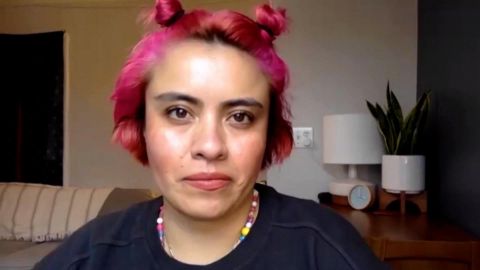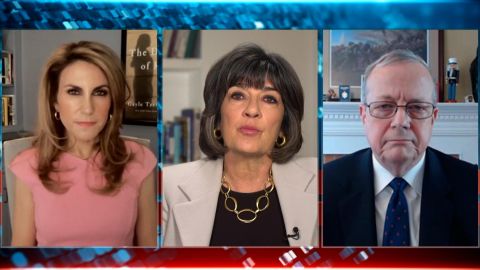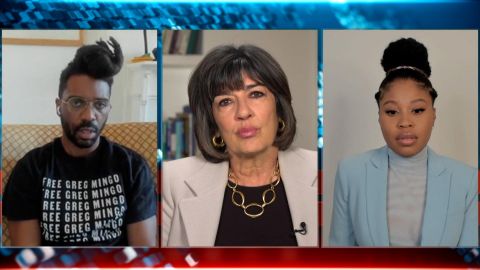Read Transcript EXPAND
CHRISTIANE AMANPOUR: Now, the Biden administration has made one of its top priorities, immigration reform. Rarely do we hear from immigrants themselves about the long-term impact of family separation, especially on children. Karla Cornejo Villavicencio was just 18 months old when her parents left her behind in Ecuador to move to the United States. They returned a few years later, but Carla still lives with the consequences of that decision, and worries for other children who without their parents. In her book, “The Undocumented Americans,” she shares her own story and those of others fighting for survival. And here she is talking with contributor, Aarti Shahani.
AARTI SHAHANI, CONTRIBUTOR: Thanks, Christiane. And, Karla, welcome to the show today.
KARLA CORNEJO VILLAVICENCIO, AUTHOR, “THE UNDOCUMENTED AMERICANS”: Thank you for having me.
SHAHANI: So, Karla, you experienced family separation. In a different context, albeit, when you were a baby, your parents decided to go from leave Ecuador to New York City, and they left you behind with family and sent for you years later when you were around age 5. What was that experience for you?
VILLAVICENCIO: I was separated from my parents at a prime developmental stage. I was 18 months old. I don’t think I was done being weaned. And I reunited with them when I was shy of 5 years old. And for many years, therapists would tell me that it had impacted me. But I thought that it was low hanging fruit. I thought that laziest therapists would just point at that and say that it had impacted me. And I thought I’m like a literary scholar. I’m a writer. I can close read my life better than anyone. That’s lazy. And I would just leave them. And then it became apparent as I both had more knowledge of my mental illnesses, and I did more research into migrant communities that there is like tangible material, psychological impact in the lives of children when separated from their parents in an early age and it manifest itself through trauma that can and/or cannot develop into mental illness. And I have to be careful around how I speak about that, because like most societies, American society has such a taboo around it. So, to speak about the fact that the children who are in cages right now, when they are in their late teens or early 20s, they might develop mental illnesses. That’s a risky thing to say. That’s already issuing them, you know, declarations of stigma that they don’t deserve.
SHAHANI: You don’t want to stigmatize them but it is genuinely your concern as well?
VILLAVICENCIO: Yes.
SHAHANI: And personal experience?
VILLAVICENCIO: I am a high functioning person. I’m a very successful person. I have been batting — I don’t know the baseball terms. I probably have like A-rod’s, like, batting status, whatever. I’ve batted every single thing life has thrown at me perfectly. And yet, I live with the mental illness, specifically with borderline personally disorder. And what that specifically is, is that when I was young, when I was a child, I had an attachment disruption. And I was not soothed when I was in distress. There was no adult who took care of me when I felt scared or alone or when I was in trouble. Part of this may be biological. It likely is because there is intergenerational trauma in my family, like many of our families. But I was neglected emotionally. I was — I never learned to self-soothe. And when I was reunited with my parents, I lived a life of — my parents gave me everything they possibly could. They loved me. They nurtured me. They encouraged me. I mean, I think they literally thought that I could be like concurrently president of the United States and Ecuador at the same time (INAUDIBLE) what the constitution said.
SHAHANI: No pressure.
VILLAVICENCIO: But I lived with precarity, you know. I knew that I could stop it at any time. When you live with that fear as a child all the time, it changes your brain. Your brain is still forming. My father changed every day until he eventually fell apart because of racist and xenophobic abuse and labor abuse and wage theft in this country. My mother fell apart for similar ways. And I had to watch that as a child. And eventually, I started parenting them. And I — my parents are alive, but they are not my parents anymore, they are people I take care of. And I know that this is the fate of many of these children if they are allowed to stay in the United States, that will be considered a win by some people. But I know that even if they go to Harvard on a full ride like I did, even if they go to Yale and get a Ph.D. like I did or like I’m about to, even if they are writing books and novels and TV shows like I am doing, they will feel panic in their body every time they just get a flashback of a memory about their parents and how they can’t save them or about any immigrant and how they can’t save them. They will need medical help. They will need tools that this country does not have the infrastructure for, especially for children of color, especially for black immigrants, especially for undocumented kids, and that’s what scares me.
SHAHANI: It sounds like you have a very strong caution that you are trying to give — that you’re giving through your writing, through your speaking to political leadership in this country. I am paraphrasing. But what I am hearing you saying is, hey, even me as a success story, Harvard graduate, soon to be Yale Ph.D., I’m drowning to some extent in trauma, and this is by design what happens for undocumented children.
VILLAVICENCIO: I’m actually not drowning anymore, because for migrants it’s Russian roulette and because I was lucky. I have wonderful insurance because of my partner’s job and I was able to get wonderful behavioral therapy for my BPD, which is called DBT, and it has changed my life profoundly. I’m on pretty expensive psyche meds and I have a great support system around me. I have learned to have boundaries with my parents. I have skills that I use that keep me healthy. Is — are those things accessible to most children of immigrants? Will those things be accessible to those — like you literally have to be a statistical anomaly and miracle in order to — like you have to play Russian roulette and you have to win like in order to beat these things. The odds are against you. And it’s not like the way that the propaganda that we have been fed that like you follow the American dream, and if you are playing the cards right and work hard at school and if you just — like that’s not what makes you survive and makes you thrive. A lot of it is luck and a lot of it is resources.
SHAHANI: Karla, you used the term dream, and I want to ask you something, throughout your book, “The Undocumented Americans,” you continually take issue with language. You stop and you pause and you interrogate the terms that we now take for granted. One of those terms, a term that you seem to hate is dreamer. You would be counted as a dreamer, an undocumented student brought here young but you like that term. How come? Why don’t you like dreamer?
VILLAVICENCIO: Look at me. It is not punk rock. It’s corny. It also it’s propaganda. I would be OK with the term dreamer if it was — if dream was capitalized to show that it’s an acronym for the Dream Act, but it’s not. It’s now lower case to show that it’s like a descriptor of an effective experience, which means that you are a person who dreams. And in literature, a person who has a lifelong dream tends to be a tragic figure because they don’t achieve the dream. And that just tends to be the case. And I’m not that kind of person. I’m a person who has goals. I’m a person who is willing to do anything to get those goals, short of breaking the law. I mean, other than like, you know, having lived illegally here for, you know, a long time. But it’s not even my — it wasn’t my dream. It was my parents’ dream. And my parents’ dream was like, let’s work here for two years to pay off our debts. You know, I think it’s just such a — it’s — I — the concept of the American dream is something that really belongs to the criminal underclass, you know. It’s like it’s in the “Godfather” movies, it’s Jay Batsby, it’s the bootleggers, it’s Joe Kennedy deciding that his oldest most handsome son was going to be president of the United States. That’s the American dream. And Americans need to understand that. Like it doesn’t belong to Pollyannas (ph) who decide that — you know, that like they’re from a small town and they’re going to make it big on Broadway, because if that is what they want to do, they’re going to have some dark nights doing things they don’t want to do on their way there. Like the American dream is dark. The American dream is paved like on the road to hell. Is that the idiom?
SHAHANI: I hear what you’re saying. And, I mean, I — what I — I hear what you are saying and that when I think about my exposure to the concept of the dream, I do remember growing up and watching “Godfather” movies and sort of having an impression about what it meant to cross into a world where you didn’t quite belong. And that’s the cynical and dark underside of what the American is. At the same time, Karla, when you travel across the country and different kind of recorded trips for your writing, you’re, for example in Flint, Michigan. In Flint, Michigan, you come across undocumented young people, and you start wanting to mentor them. You hear, oh, you know, they want to bus tables, they want to be, you know, waitresses at the local bar and make tips. And you’re like, hey, my dad makes tips. It’s a horrible life, be ambitious. You know, don’t you want to college? Don’t you want to dream bigger? So, in that sense I wondered, do you kind of believe in the dream too?
VILLAVICENCIO: I believe in hustling, yes. I mean, I grew up in the hood. You know, you hustle, you make a living, you always come up with different ideas. I believed that, you know, those girls might not have had the same specific aspirations that I had, but I knew that they were going to be wily about getting those tips and they were going to be clever. And immigrants have hustle. And I believe that all people who are underdogs and who have ambition have hustle. And that’s from the streets. That’s from the marginalized communities. That’s from immigrant communities. That’s mob. I respect that.
SHAHANI: So, you’re saying it here, and I guess I want you to elaborate further, you write about the undocumented workers who were not the first responders, but the second responders in the September 11th attacks against New York City, our city. You write about the undocumented immigrants, the day laborers who started cleaning up after Hurricane Sandy. Why was it important to you to document that, hey, these people are a huge part of these, you know, historic moments, these crises in contemporary America?
VILLAVICENCIO: Because their erasure made me sad. I wasn’t so much talking about the value of the labor, the undocumented immigrants and the cleanup of ground zero, but the fact of their exploitation and the fact that this happens after every national crisis, for every national disaster. It happened after Katrina, it happened after Sandy, it happened after 9/11, it happened — it’s happening during pandemic where we’ve developed this beautiful word, it’s just a beautiful fascistic word of essential worker where we call them heroes so we don’t have to pay them or protect them in any way. And the organizing around this has always been like, if these people are willing to get risk their very lives with like the (INAUDIBLE) pay, no health insurance while everyone else is pretty comfy like — and if they get sick, shouldn’t be able to — should they be able to apply for a green card in the same way that like some people are able, like domestic violence victims are able to apply for a u-card or people are able to apply for like a green card with their spouse, and the answer has always been no. And these are people who have laid their lives on the line to protect American citizens’ convenience and comfort. And, you know, like agricultural workers, like have fed us throughout this pandemic. And so, this is a history that keeps repeating itself over and over and over. And so, that is why I decided to tell that story. My father, having worked in the restaurant industry, I have heard stories of people who died, people who were incinerated and nobody would come forth with their names because they were scared. And their names were not on the memorial. And that frightened me. And so, that’s why I wrote about them. So, like that’s — those are the little details of the stories that I want to get across.
SHAHANI: Karla Cornejo Villavicencio, I want to thank you very much for your time speaking with us today.
VILLAVICENCIO: Thank you for having me.
About This Episode EXPAND
Gayle Tzemach Lemmon and Gen. John Allen (Ret.) discuss the book “The Daughters of Kobani.” Director Shaka King and actress Dominique Fishback discuss the film “Judas and the Black Messiah.” Karla Cornejo Villavicencio discusses immigration, family separation and her book “The Undocumented Americans.”
LEARN MORE


